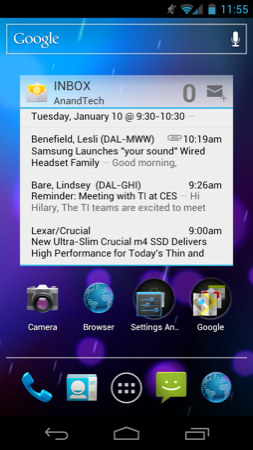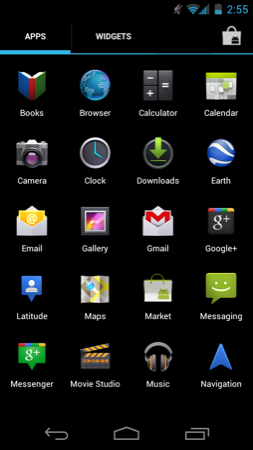Samsung Galaxy Nexus & Ice Cream Sandwich Review
by Brian Klug & Anand Lal Shimpi on January 18, 2012 1:34 PM ESTGoogle employs more than 20,000 people worldwide and the number of them working on Android are in the single digit percentage range. Google's business is search, but it has always had aspirations of more. Android isn't just a chance to capitalize on mobile search for Google, it's also an opportunity to grab power in the next era of personal computing. If you believe that smartphones will eventually replace mainstream PCs, who wouldn't want to be to smartphones what Microsoft was to PCs in the early 1990s?
Previous versions of Android have been cautious, evolutionary steps along a path to being a more open/flexible alternative to iOS. Starting with Honeycomb (Android 3.0) however, Google began to step out of the shadow of its competitors and really start to define Android as a mobile computing platform. Honeycomb was limited to tablets but its successor, Ice Cream Sandwich (Android 4.0), would bring unification to Android across both tablets and smartphones.
Today we look at both ICS and its launch vehicle, Google's Galaxy Nexus.
The Android vs. iOS Debate
It's very clear to me now more than ever that Apple and Google have completely different goals with their mobile OS strategies. Excluding the unclear strategy behind Chrome OS, Android is pretty much Google's primary operating system. The unified tablet/smartphone strategy behind Ice Cream Sandwich makes sense because for Google to succeed in the OS business it needs to deploy Android on everything from smartphones to notebooks. We've already seen the strengths in having a smartphone platform with a strong app ecosystem. Things become even more appealing if you have a phone, tablet and PC that all run the same OS and apps. As Android is Google's one-size-fits-all operating system, it needs to have a broader and slightly more ambitious focus than iOS otherwise it risks losing the race in the long run.
Apple is in a different position. It already has a successful desktop/notebook OS that is continuing to grow. While iOS has been a runaway success for Apple, the Mac OS X platform is a solid option for any user who needs more than their iPhone or iPad can provide. The two OSes may converge or at least borrow heavily from one another, but in the interim they can remain independent. If you need more of a computing experience Apple is happy to sell you a Mac. If you want the it-just-works appliance experience in your phone or tablet, Apple has a whole bunch of iPhone/iPad configurations to offer you.


ICS isn't a step towards iOS. If anything it proves that Google is committed to its own trajectory. Android is an OS that, although more closed than many would like, still allows more flexibility than iOS. You can sideload apps not purchased in the Market. The file system isn't completely hidden from you. You can even override the default zoom level on web pages. Apple and Google both pour tons of time and research into figuring out the best way to do something. And, to be honest, I feel like Apple generally does a better job of "getting it" for the very mainstream consumer. Rather than attempt to make the perfect mold however, Google gives you one that's a bit more flexible.
I've said this before but I do believe that Apple is trying to deliver more of an appliance experience, whereas Google is providing you with a modern take on a traditional computing experience. If the appliance is a smartphone, then both approaches are equally capable - it's just a matter of personal preference.
What's new in ICS really falls into one of three categories:
- Improvements in UI frame rate due to OpenGL ES rendering (non-skia) path
- UI tweaks
- New features
Nowhere in this list is a fundamental change in the way Android works. I feel that this is a very important point to understand and likely the cause for lots of disagreement when it comes to just how impressive (or not) ICS is.
ICS is smoother, more polished and has its own set of new features that make it a significant step forward for Android. What ICS is not however is an outright clone of iOS. If you prefer the iOS experience to Android, ICS will do nothing to change your opinion. If all you were missing from Android was a smoother UI, then its fourth major release should be almost everything you could ask for.










185 Comments
View All Comments
bjacobson - Wednesday, January 18, 2012 - link
I believe most of the readership is willing to wait--it's the price we pay for the most analytical reviews the net has to offer, and I definitely hope AT doesn't take a page from Tom's Hardware's book... That said, this one does seem a bit delayed, poor Anand has too much to do...dwang - Wednesday, January 18, 2012 - link
Any remaining lag issues in ics is due to software and not hardware.4.0.3 has significant performance enhancements that address any remaining lag issues in the browser and buttons.
For example, theverge.com lags pretty badly in 4.0.1/4.0.2, but is buttery smooth in 4.0.3. Check out this youtube video.
http://www.youtube.com/watch?v=IN27yZQWfU0
Either wait for google to push out 4.0.3 to the galaxy nexus or install one of the many custom 4.0.3 roms from xda.
http://forum.xda-developers.com/forumdisplay.php?f...
cgalyon - Wednesday, January 18, 2012 - link
I've noticed popping and static coming from my GNexus when using apps (such as AmbiSciPS) that include extremely low tones (like 1.05Hz). I never had this problem with my Droid X, so I'm wondering if this is a limitation of the GNexus in general or if maybe I'm having bad luck. I don't suppose there's a way you could test the ability of the phone to produce tones across a broad range of frequencies?bjacobson - Wednesday, January 18, 2012 - link
considering 1hz is 6hz below the threshold of human hearing (7hz), 19hz below what most headphones support (20hz), and about 80hz below what perfect-pitch musicians could identify as do, rei, me, fah, so, lah, or ti, I think you're asking a bit much...gorash - Wednesday, January 18, 2012 - link
I hope Android becomes a full-fledged desktop OS pretty soon, and it would be interesting to see how iOS will pan out in a few years.We're ready to say GOODBYE to Windows hegemony.
Zoomer - Thursday, January 19, 2012 - link
No thanks, that would suck badly.sjankis630 - Wednesday, January 18, 2012 - link
I have the Galaxy Nexus and while I love it, I am coming from the Droid Eris, I have noticed several picture heavy sites which cause stuttering while zooming. I was slightly taken aback. I don't care how well my phone does against some other phone in a contest. I do, however, mind when visiting some sites makes it kind of annoying trying to get around.2 particular problem sites for me are : www.theverge.com and www.msnbc.com
Lovely phone though.
dwang - Wednesday, January 18, 2012 - link
wait for 4.0.3 that addresses the browser lag issues.Here is 4.0.3 on theverge.com
http://www.youtube.com/watch?v=IN27yZQWfU0
notext - Wednesday, January 18, 2012 - link
love my nexus even though I dropped it and put a big ass crack on the screen. dropped my iphone many times and it never had a problem. Hopefully it was just a bad hit and not a sign of its design.notext - Wednesday, January 18, 2012 - link
and i will send you my broken glass once I can get a replacement. The closest repair place here in austin said it is unavailabe right now.